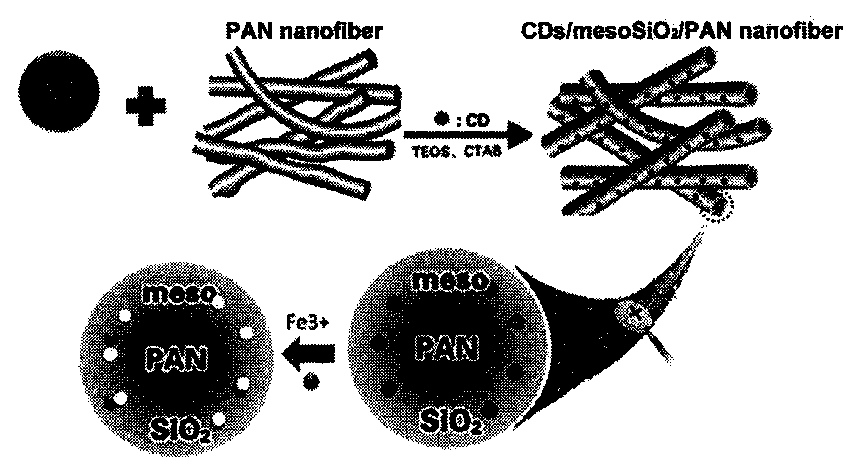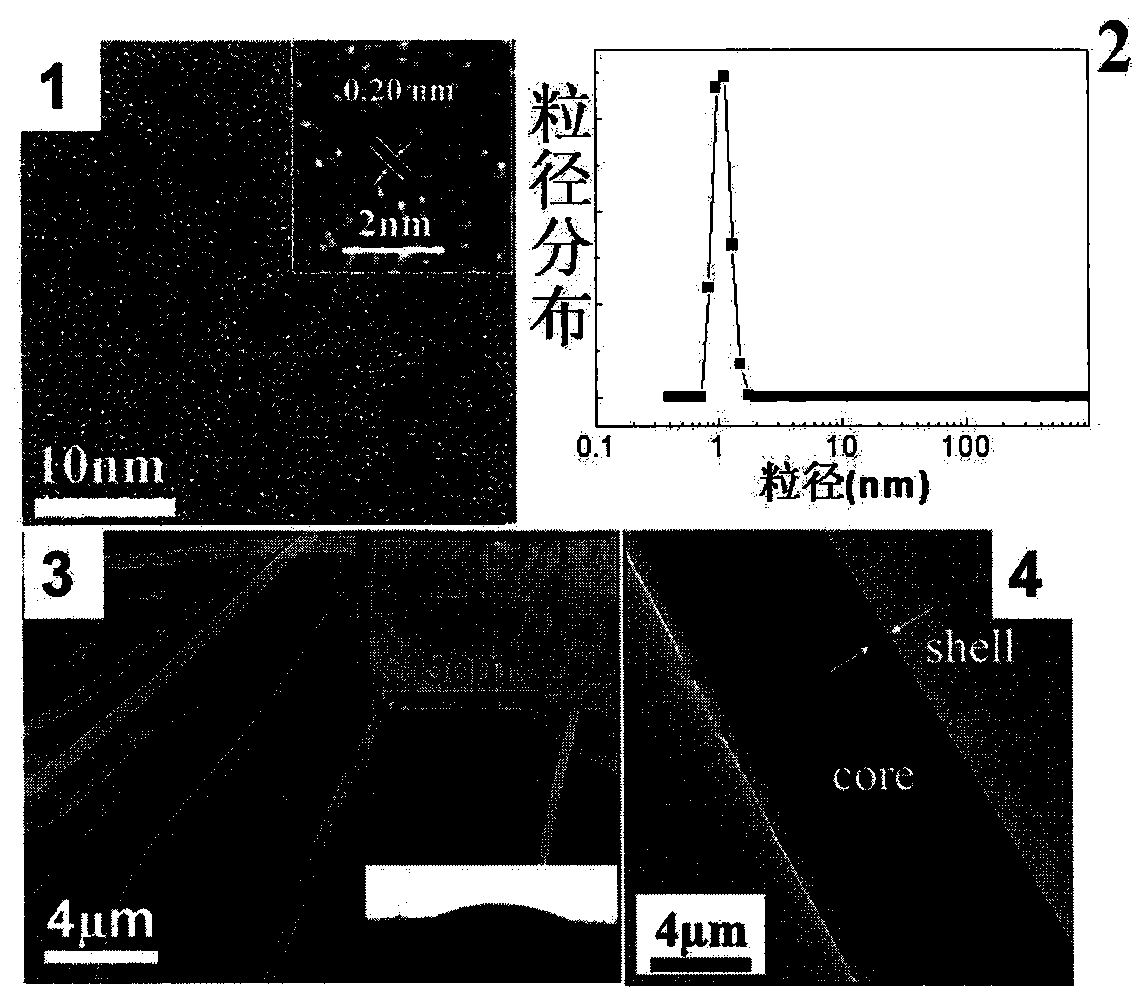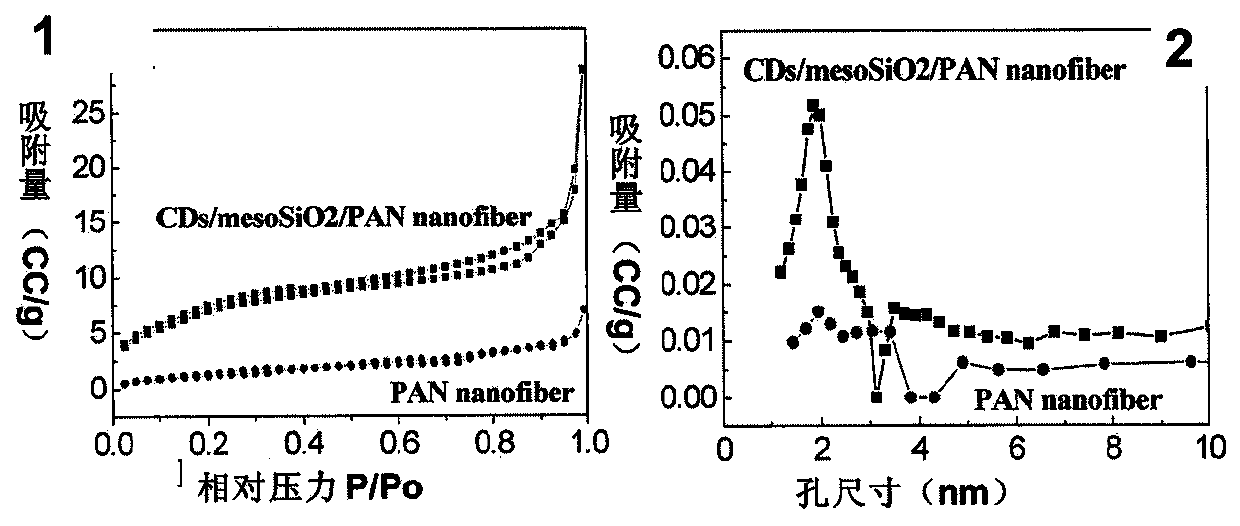Preparation and application of mesoporous silica/polyacrylonitrile core-shell nanofiber membrane loaded with carbon quantum dots
A technology of mesoporous silica and nanofiber membrane, applied in measurement devices, fluorescence/phosphorescence, chemical instruments and methods, etc., can solve the problems of difficult separation and recovery of carbon quantum dot materials, and achieve good pH stability, large Application potential, effect of simple preparation method
- Summary
- Abstract
- Description
- Claims
- Application Information
AI Technical Summary
Problems solved by technology
Method used
Image
Examples
Embodiment 1
[0022] a. The polyacrylonitrile nanofiber membrane with a molecular weight of 50,000 is immersed in a 1:0.2 ethanol:water mixed solution for ultrasound;
[0023] b. During ultrasound, add cetyltrimethylammonium bromide, carbon quantum dot solution, ethyl orthosilicate and ammonia with a concentration of 27wt% in a mass ratio of 1:0.2:0.5:0.5 for sol-gel Reacting to obtain a mesoporous silica / polyacrylonitrile nanofiber membrane mixture with carbon quantum dots immobilized on the outer surface;
[0024] c. Continue the sol-gel reaction and stir the obtained mixture at room temperature for 1 hour;
[0025] d. The mixture in step c is refluxed and washed three times in an ethanol-hydrochloric acid solution with a mass ratio of 1:0.05 to remove the mesoporous porogen to obtain a mesoporous silica / polyacrylonitrile core-shell loaded with carbon quantum dots Nanofiber membrane.
Embodiment 2
[0027] a. The polyacrylonitrile nanofiber membrane with a molecular weight of 100,000 is immersed in a 1:1 ethanol:water mixed solution for ultrasound;
[0028] b. During ultrasound, add cetyltrimethylammonium bromide, carbon quantum dot solution, ethyl orthosilicate and ammonia with a concentration of 27wt% in a mass ratio of 1:1:2:2 for sol-gel Reacting to obtain a mesoporous silica / polyacrylonitrile nanofiber membrane mixture with carbon quantum dots immobilized on the outer surface;
[0029] c. Continue the sol-gel reaction and stir the obtained mixture at room temperature for 6 hours;
[0030] d. The mixture in step c is refluxed and washed 7 times in an ethanol-hydrochloric acid solution with a mass ratio of 1:0.2 to remove the mesoporous porogen to obtain a carbon quantum dot-loaded mesoporous silica / polyacrylonitrile core-shell Nanofiber membrane.
Embodiment 3
[0032] a. The polyacrylonitrile nanofiber membrane with a molecular weight of 150,000 is immersed in a mixture solution of ethanol: water with a mass ratio of 1:0.5 for ultrasound;
[0033] b. During ultrasound, add cetyltrimethylammonium bromide, carbon quantum dot solution, ethyl orthosilicate and ammonia with a concentration of 27wt% in a mass ratio of 1:0.5:1:1 for sol-gel Reacting to obtain a mesoporous silica / polyacrylonitrile nanofiber membrane mixture with carbon quantum dots immobilized on the outer surface;
[0034] c. Continue the sol-gel reaction and stir the obtained mixture at room temperature for 3 hours;
[0035] d. The mixture in step c is refluxed and washed 5 times in an ethanol-hydrochloric acid solution with a mass ratio of 1:0.05-0.2 to remove the mesoporous porogen CTAB to obtain mesoporous silica / polypropylene loaded with carbon quantum dots Nitrile core-shell nanofiber membrane.
PUM
| Property | Measurement | Unit |
|---|---|---|
| particle size | aaaaa | aaaaa |
| diameter | aaaaa | aaaaa |
Abstract
Description
Claims
Application Information
 Login to View More
Login to View More - R&D
- Intellectual Property
- Life Sciences
- Materials
- Tech Scout
- Unparalleled Data Quality
- Higher Quality Content
- 60% Fewer Hallucinations
Browse by: Latest US Patents, China's latest patents, Technical Efficacy Thesaurus, Application Domain, Technology Topic, Popular Technical Reports.
© 2025 PatSnap. All rights reserved.Legal|Privacy policy|Modern Slavery Act Transparency Statement|Sitemap|About US| Contact US: help@patsnap.com



